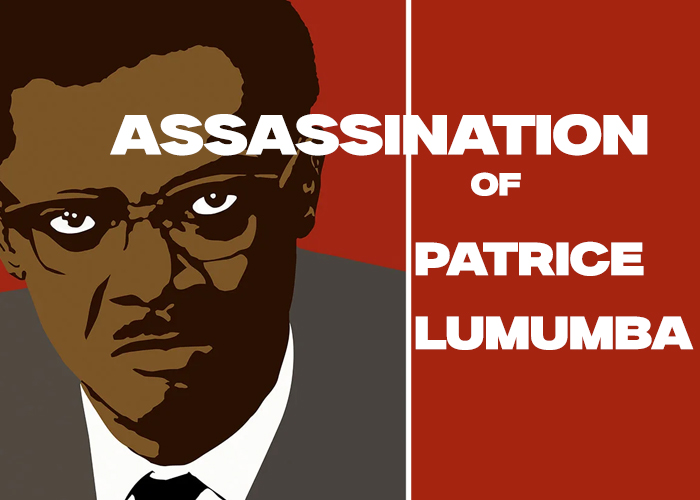On January 17, 1961, one of Africa’s most promising leaders, Patrice Lumumba, was brutally assassinated. His death was not just a tragic loss for the newly independent Congo but also a defining moment in Cold War geopolitics, exposing the sinister involvement of Western powers in African affairs. The conspiracy behind his murder involved Belgian officials, the CIA, and, as some reports suggest, Britain’s MI6. The story of Lumumba’s assassination is one of betrayal, fear, and a ruthless desire to maintain Western dominance over Africa’s resources.
Who Was Patrice Lumumba?

Patrice Émery Lumumba was born on July 2, 1925, in Onalua, in the Belgian Congo (now the Democratic Republic of Congo). A charismatic and visionary leader, he was instrumental in Congo’s struggle for independence from Belgium. Lumumba became the first Prime Minister of the independent Congo in June 1960. However, his radical stance on nationalism, unity, and anti-colonialism made him a target for powerful forces who saw him as a threat to their interests.
The Political Chaos in Post-Independence Congo

The independence of Congo from Belgium on June 30, 1960, was met with great celebration, but it was short-lived. The country quickly descended into turmoil as internal divisions and external pressures mounted. Within days of independence, the mineral-rich province of Katanga, led by Moïse Tshombe, declared secession with the backing of Belgium, which sought to maintain control over Congo’s resources.

Meanwhile, the Cold War battle between the Soviet Union and the West played out in Africa. Lumumba, seeking to maintain Congo’s sovereignty, sought assistance from both the United Nations and, when rejected, the Soviet Union. This alarmed the United States and its allies, who feared that Congo could become a communist stronghold.
The Plot to Eliminate Lumumba
As Lumumba fought to hold his country together, his enemies were already planning his downfall. The United States, Belgium, and Britain saw him as a dangerous figure who could disrupt their geopolitical and economic interests in Africa. A series of covert actions were put into motion to neutralize him.
The CIA’s Role
Declassified documents and testimonies reveal that the CIA was deeply involved in efforts to eliminate Lumumba. U.S. President Dwight D. Eisenhower allegedly gave a direct order for his assassination. CIA chief Allen Dulles saw Lumumba as “a Castro or worse,” referencing Cuban leader Fidel Castro’s defiance of American influence.
One of the CIA’s key operatives in the Congo, Larry Devlin, was tasked with the mission. The agency even considered poisoning Lumumba, with one plot involving toothpaste laced with a deadly toxin. Though this plan was ultimately abandoned, the CIA played a crucial role in setting the stage for Lumumba’s capture and eventual assassination.
Belgium’s Role
Belgium, the former colonial ruler of Congo, was particularly invested in getting rid of Lumumba. The Belgian government worked closely with Congolese factions that opposed Lumumba, particularly Moïse Tshombe and Joseph Mobutu (later Mobutu Sese Seko), who would later rule Congo as a dictator for decades.
Belgian officials and officers directly orchestrated Lumumba’s transfer to Katanga, where they ensured his execution. Declassified Belgian documents confirm that the government approved of his elimination, fearing that his influence would undermine their economic hold over Congo’s rich resources.
MI6 Involvement: Did Britain Play a Role?
While the involvement of the CIA and Belgium is well-documented, Britain’s MI6 role remains a topic of speculation. In 2013, former British intelligence officer Daphne Park reportedly suggested that MI6 had a hand in Lumumba’s assassination. Although no official British documents confirm this, Britain, like the U.S., saw Lumumba as a serious threat.
Given Britain’s strategic interests in Africa, it is plausible that MI6 cooperated with American and Belgian intelligence to remove Lumumba from power. His vision of an independent, united Africa did not align with British colonial ambitions in the region.
The Capture and Execution of Lumumba

In September 1960, President Joseph Kasavubu dismissed Lumumba as Prime Minister, under pressure from Western powers. However, Lumumba still had widespread support and attempted to rally his followers. This made him an even bigger threat.
In November 1960, he was captured by forces loyal to Colonel Joseph Mobutu, who had staged a coup with CIA support. Lumumba was placed under house arrest but later managed to escape. However, he was recaptured on December 1, 1960, and severely beaten by Mobutu’s forces.
On January 17, 1961, Lumumba was flown to Katanga, controlled by his arch-rival Moïse Tshombe. There, under the supervision of Belgian officers, Lumumba was executed by a firing squad, along with two of his close associates, Maurice Mpolo and Joseph Okito. His body was then dismembered and dissolved in acid to prevent his grave from becoming a martyr’s shrine.
Belgian police officer Gerard Soete later admitted to playing a role in the disposal of Lumumba’s body, even keeping some of his teeth as trophies, a grim reminder of colonial brutality.
Aftermath and Global Reaction
News of Lumumba’s assassination sparked outrage worldwide. Protests erupted in several countries, and he was hailed as a martyr of African liberation. The Soviet Union condemned the act, using it as propaganda against Western imperialism. Even within the United Nations, Secretary-General Dag Hammarskjöld faced criticism for failing to protect Lumumba.

In Congo, Joseph Mobutu cemented his power, ruling as a dictator until 1997, with continued support from Western allies. The country fell into decades of dictatorship, instability, and economic exploitation.
Lumumba’s Legacy
Despite his brutal end, Patrice Lumumba remains a symbol of African resistance against imperialism. His vision for a unified, independent Africa inspired future generations of leaders, including Nelson Mandela and Thomas Sankara. Today, his name is synonymous with the fight for true sovereignty in Africa.
In 2002, Belgium formally apologized for its role in Lumumba’s assassination, acknowledging its “moral responsibility.” However, justice has never truly been served, and many questions about the full extent of Western involvement remain unanswered.
Conclusion
The assassination of Patrice Lumumba was one of the most significant political murders of the 20th century. It was not just the elimination of a leader but a strategic move to maintain Western dominance over Africa’s vast resources. The CIA, Belgium, and possibly MI6 orchestrated a calculated conspiracy to ensure that Congo remained under neocolonial control.
More than six decades later, the echoes of Lumumba’s assassination still resonate. His vision of an independent Africa, free from foreign exploitation, remains unfulfilled. However, his legacy lives on in the hearts of those who continue to fight for Africa’s liberation and self-determination.
His final words before his death serve as a powerful reminder: “History will have its say. It shall not be the history which will be taught in Brussels, Washington, Paris, or the United Nations but the history which will be taught in the countries emancipated from colonialism and its puppets. Africa will write its own history and in both north and south it will be a history of glory and dignity.”





